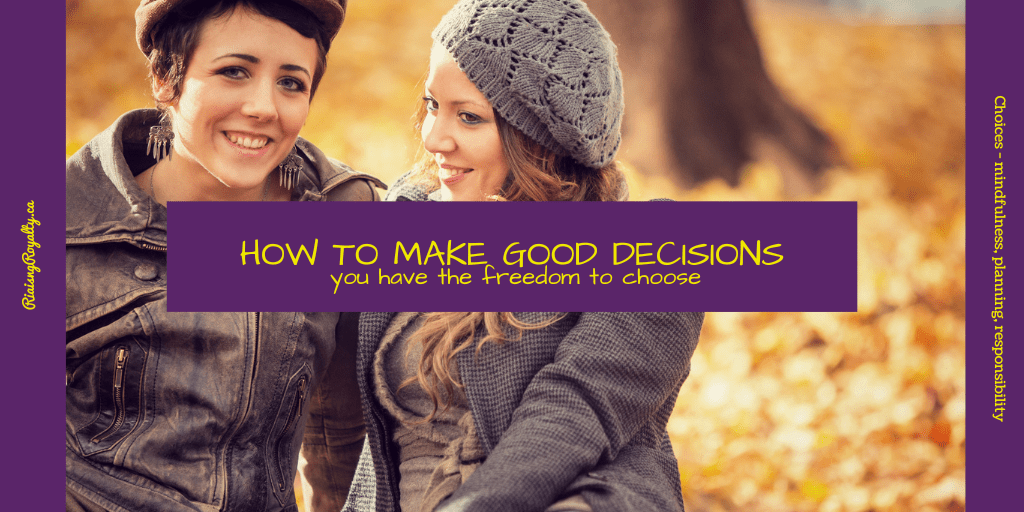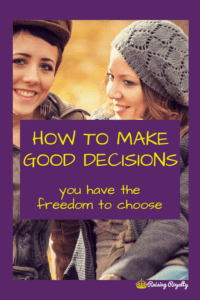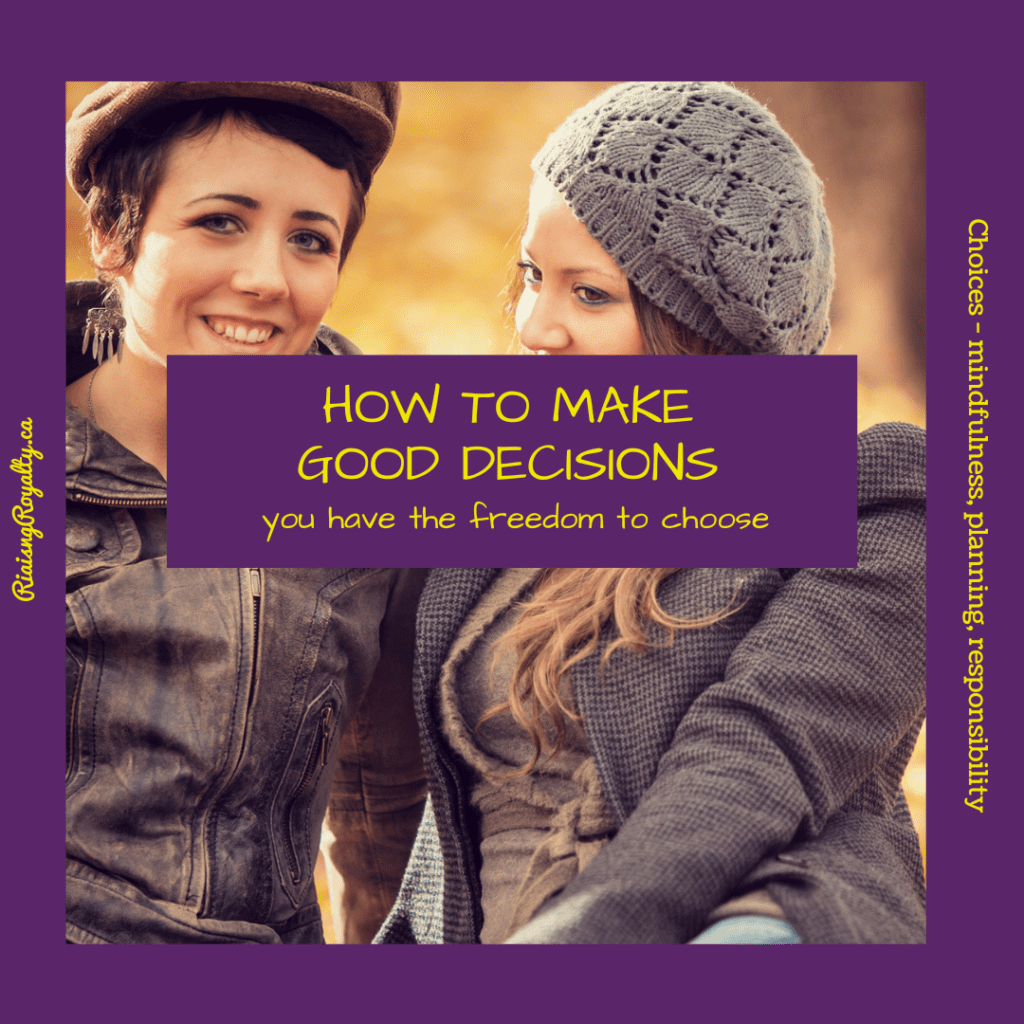

You have the freedom to choose.
But how do you make good choices? There are a lot of choices out there. You can choose how you decorate your home, how you maintain your health, and your own fashion style. You can choose how you raise children, what kinds of relationships you have, and what activities you spend your time on. And you can choose where you live, what kind of job you have, and even your values and beliefs. With the abundance of information at our fingertips, we get a lot of information, and it’s easy to change all of those things quickly, too.
Here’s where it gets interesting. Changing some choices is much less impactful than others. For example, changing your fashion style or music preference doesn’t really affect anyone but yourself. But changing how you parent, or what kind of job you have, or who you vote for can have an impact on not just you, but your family and community.
The problem is when we make decisions about our lifestyle the same way we make decisions about our appearance or activities. Changing your diet the same way you might change your clothes could have serious consequences for your long term health. That’s why yo-yo dieting is so discouraged.
An even bigger problem is when we feel like we have to justify our decisions by making other people agree with us – or by activating negatively towards those who make different decisions.
We each of us have what experts call “agency”, the ability to make choices. We can make carefully-considered, informed choices, or instinct-driven impulsive choices, or value-based thoughtful choices, or anything in between.
There is a “right” way to do things, but there isn’t a universally-right way.
The specific details of any choice don’t really matter, as long as it works for you, in your circumstances, with the tools and energy you have available.
The key to making good choices – especially when it comes to choices that have a long-term impact – is deliberation, responsibility, and habit.
Mismatched socks don’t affect the stock market and eating ice cream for dinner once won’t change your weight that much. However, being rude to customers regularly and yelling at your kids for the slightest mistake will affect your business and your family relationships long-term. Maybe even to the point of losing them.
Poor parenting, poor governing and poor business decisions happen when there is no thought. Inconsistency in education, in policy or in sales happens when you flip-flop among radically different choices. And instability happens when decisions are made on pure emotion.
We shouldn’t decide how we are going to raise our kids or spend taxes the same way we decide on what’s for breakfast.
I do believe there is a one, best way. I don’t believe there’s a universal one best way.
I don’t believe that the “right way” will look the same for everyone, especially when it comes to lifestyle choices. The most important thing for any decision about how you live your life is that you are consistent about it.
This is why it’s so important to think carefully about how you will do things before they come up.
Trends treat treasure like trash. But if you take the time and ask questions from those who have been there, done that, you can make good choices. Carefully consider the pros and cons — count the cost! Then decide, for yourself, what you will choose. And stick with it.
Sometimes we lack awareness of the freedom to choose.
That’s why we tend to have bad habits so frequently, and why we feel like we are continually struggling. We live life on “autopilot”, letting what has always been done dictate what we will do. We make the same choices that our parents did, or that were taught to us by our culture, religion or the society we live in.
And sometimes, those choices actually hurt.
You don’t have to live life on an autopilot that hurts you. You have that freedom to choose, if you could just recognize it. And, you have a responsibility to actually make a decision.
You can just react on instinct or habit in the moment, based on habits you haven’t deliberately chosen. Or you can choose for yourself, and develop habits that serve you better.
How do you develop your awareness of your agency?
Mindfulness, planning, and responsibility.
Mindfulness is how well you are aware of yourself, your values and beliefs, and the choices that you make.
You can develop mindfulness by paying attention to the small decisions you make, by exposing yourself to different ideas, and by reflecting on the choices you have made in the past.
A simple way to become more mindful is to read things that challenge your beliefs, or to listen to people who have different ideas than you, even if you might find them offensive. You don’t have to agree with them, but just listening carefully can help you become aware of why you believe what you believe. And being more aware helps you recognize your own ability to make good choices.
Planning is how well you are aware of the consequences of your choices.
It’s like playing chess, but with your life. To play chess well, you have to think several moves in advance, but also for several different possibilities, depending on what your opponent chooses. If you move one piece to one square, and the other play reacts the way you expected, you’ll have a planned path out to victory. But if your opponent does something different, planning can help you turn the unexpected into success.
An easy way to practice this is to use webmaps to make decisions, rather than pro-con lists. Webmaps look kind of like spider webs, with threads going in multiple directions. This lets you see multiple connections, and follow the consequences of various choices to their end.
Responsibility means simply taking ownership of a choice and the dealing with the consequences yourself.
There are two parts to it. They go hand-in-hand, and one is the logical extension of the other. First, there is the active taking responsibility for your own choice. Second, there is not taking responsibility for things that were not your choice.
Of the two parts of responsibility, the first is the easier one, because we actively make choices. It’s easy to take responsibility when we know it was our choice to do (or not do) an activity. Choosing to skip breakfast, and owning that choice and the resulting hunger is a pretty easy concept. If I choose to skip a meal, I will be hungry.
But the 2nd – NOT taking responsibility for other peoples’ choices – is harder.
On the surface, it doesn’t look hard. Why would I take ownership of the fact that my co-worker didn’t bring his umbrella when it’s raining? It’s not my job to remind them.
But when it’s our close family – kids, partner, etc – then it can be harder to determine what is your choice and what is the choice of others. And it’s especially more difficult as parents, because much of our children’s behaviour reflects on our teaching and training as parents. Their choices are often limited by our choices.
Practicing responsibility in decision making means apologizing authentically when we’ve made mistakes. The key word here is “authentically”, because if you are faking the apology, you either don’t need to take responsibility or you don’t actually regret the choice.
By the way, not regretting a choice is also taking ownership of it.
Once you’re aware of your ability to choose, you can make new choices.
However, old habits can be hard to change, because they get ingrained into our brains. It’s really just science. The more you follow a certain pattern of thought and behaviour, the faster the physical neurons in your brain connect, and the easier that connection is made. Like water, your thoughts and actions will tend to follow the easiest path, so it becomes a self-fulfilling prophecy.
You will do what you`ve always done — unless you choose otherwise.
But we have this power to choose, and the more aware we are of our choices, the easier it is to choose. And the more you make the right choice, the easier it is to make the right choice again.
You can retrain your brain.
So why do we make the choices we do?
We make choices based on what happened, what is happening and what is going to happen — the past, the present and the future.
However, our lack of awareness of our choices will make us unaware of why we make those choices.
If we live solely in the past, we will become indecisive.
So caught up in what happened, we will be victims, and feel helpless and powerless. We will be unaware of the present moment, the choices facing us, and completely ignorant of the future consequences. We will live passively, letting life just happen to us, instead of deciding for ourselves what we will do, and what we will make happen.
If we live solely in the present, we will become impulsive.
Living in the moment is spontaneous and fun, but dangerous too. We will forget all about the past, and its lessons to be learned. Someone once said, “Those who forget history are doomed to repeat it.” Those who ignore the past make the same decisions over and over again, creating habits.
We will also forget all about the future, and its impending consequences. Then we constantly wonder why the same things happen over and over again. This life choice leads to insanity, doing the same thing over again and expecting a different result.
If we live solely in the future, we will become overly anxious.
We will forget about the past, and the victories and successes there, and we will forget the mistakes made so we do not repeat them. Then we will miss the moment of decision, paralyzed by the thought of the consequences of every choice, by not being aware of the present. We will constantly wonder what if, what if and never be able to appreciate what we have. This leads to discontentment, and a constant search for security, or a way to numb the pain of worry.
In order to really choose, we have to be aware of why we’re choosing what we’re choosing.
Sometimes, it seems animals do this better than we humans do. An animal will learn from the past — that’s why they can be trained. Animals are very (very!) aware of the present — that’s why they are opportunists. And animals plan for the future.
We humans need to live similarly, dealing with and learning from our past, in order to plan for our future, so that in the present moment our choices will be right and good.
The first thing we need to do in order to make a good choice is to deal with the past.
We all have things we wish we hadn’t done. We all have painful memories, regrets and sorrow about the past. In order to not live there, we must deal with these things. We must come to terms with the fact that no matter what it was, we had a choice. Even when we were legitimately a victim, there is still a choice — a choice of how we responded to what happened. The good thing is that choice can be made in the present, even when the victimization happened a long time in the past!
In short, the past shapes our identity.
We must also learn to recognize all the consequences of our past choices, even when they are uncomfortable. Sometimes this means we must admit we made a mistake. And that we must forgive ourselves for that mistake. Once we’ve dealt with the past, we can learn from it. We can learn which decisions led to consequences we didn’t like, and purpose to not make those mistakes again. We can figure out what we want, what we like, what we value, and what’s truly important.
The second thing we need to do in order to make good decisions is to plan for the future.
All those “what if” questions will disappear when we have a plan. You can’t decide anything if you don’t know where that decision fits in the bigger picture. Having a plan for the future means having a guide for all your decisions.
But in order to have a plan, first you must find out who you are (dealing with the past). You need to know what you want, what you like, what you value before you can develop the plan that will get you there.
Your identity shapes your destiny.
Once you have a plan, all your decisions fall into place.





